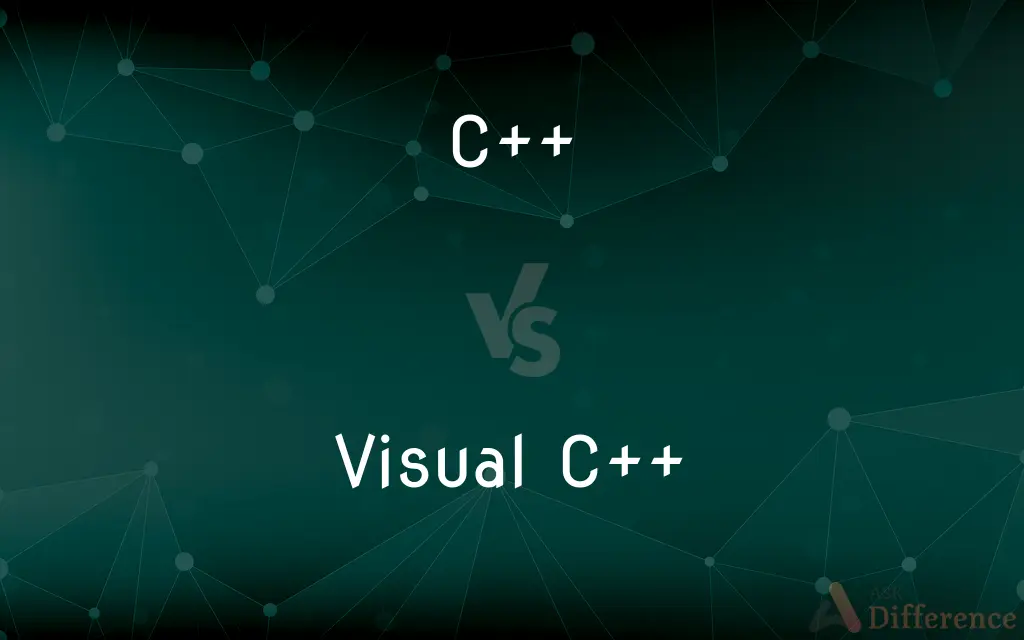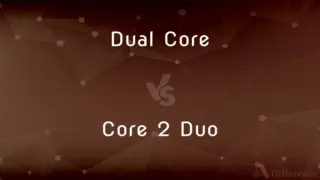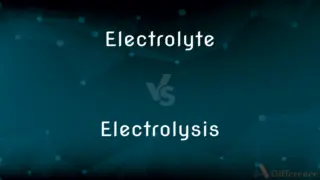C++ vs. Visual C++ — What's the Difference?
By Tayyaba Rehman — Published on January 10, 2024
C++ is a programming language, while Visual C++ is an IDE by Microsoft that uses the C++ language and provides additional development tools.

Difference Between C++ and Visual C++
Table of Contents
ADVERTISEMENT
Key Differences
C++ is a programming language, while Visual C++ is an IDE by Microsoft that uses the C++ language and provides additional development tools.
C++ vs. Visual C++ Explanation (Extended Version)
C++ is a general-purpose programming language, created as an extension of the C language with object-oriented features. Visual C++, on the other hand, is a specific Integrated Development Environment (IDE) developed by Microsoft for Windows applications, which provides tools and compilers to develop C++ programs.
C++ is known for its performance and wide use in software development, including operating systems, games, and embedded systems. Visual C++ includes Microsoft's proprietary tools and libraries like the Microsoft Foundation Class (MFC) library, making it easier to develop Windows-based applications with graphical user interfaces.
The language C++ is platform-independent and can be compiled across various platforms. Visual C++ is specifically geared towards development on the Windows platform, often utilizing Windows-specific APIs and the .NET framework, which can limit portability.
ADVERTISEMENT
While C++ is a language standard maintained by the International Organization for Standardization (ISO), Visual C++ is a product offered by Microsoft that adheres to this standard but also extends it with Microsoft-specific extensions that may not be compatible with other C++ compilers.
C++ can be used with different compilers and development environments, whereas Visual C++ refers to both the Microsoft C++ compiler and the accompanying IDE. Visual C++ applications are typically developed using the Visual Studio environment, taking advantage of its integrated debugging and code management features.
Comparison Chart
Definition
A programming language with object-oriented capabilities.
An IDE by Microsoft for C++ with tools for Windows apps.
Platform Compatibility
Platform-independent, can be used on various systems.
Primarily for Windows platform development.
Use Case
Wide range of applications, including systems software.
Focused on Windows GUI and system applications.
Standardization
Follows ISO C++ standards.
Follows ISO standards but includes Microsoft extensions.
Development Tools
Can be used with various compilers and IDEs.
Includes a specific set of tools and libraries from Microsoft.
Compare with Definitions
C++
C++ is widely used for systems programming.
He used C++ to write efficient, low-level system utilities.
Visual C++
Visual C++ provides tools like a debugger and a compiler.
Debugging in Visual C++ was seamless with its integrated tools.
C++
C++ is standardized by the ISO.
The latest C++ ISO standard introduces several new language features.
Visual C++
Visual C++ supports development with MFC.
They built the software’s interface using the MFC library in Visual C++.
C++
C++ is a high-performance programming language.
They optimized the game engine using C++ for its execution speed.
Visual C++
Visual C++ is part of the Visual Studio suite.
After installing Visual Studio, he had access to Visual C++ for his work.
C++
C++ supports object-oriented programming.
She appreciated C++ for enabling encapsulation and inheritance in software design.
Visual C++
Visual C++ is an IDE for C++ development on Windows.
She developed her Windows application using Visual C++.
C++
C++ is an extension of the C programming language.
C++ adds classes to C, among other features, making it more versatile.
Visual C++
Visual C++ includes Microsoft-specific extensions.
Their team utilized Visual C++ extensions for the project’s Windows integration.
Common Curiosities
Do I need Visual C++ to write C++ programs?
No, C++ programs can be written and compiled using a variety of compilers and IDEs, not just Visual C++.
Is Visual C++ free to use?
Visual C++ is part of Visual Studio, which has both free and paid versions.
What is C++?
C++ is a widely-used, high-performance programming language that supports object-oriented programming.
Can I use C++ on non-Windows platforms?
Yes, C++ is a platform-independent language.
Can Visual C++ be used for console applications?
Yes, Visual C++ can be used to develop both console and GUI applications.
What is Visual C++?
Visual C++ is an Integrated Development Environment from Microsoft for developing C++ applications on Windows.
Is Visual C++ available for operating systems other than Windows?
No, Visual C++ is specifically designed for Windows application development.
Can I use Visual C++ for cross-platform development?
Visual C++ is not typically used for cross-platform development due to its Windows-specific focus.
Are programs written in Visual C++ compatible with other operating systems?
Programs written with Visual C++ specific extensions and libraries may not be compatible with other systems.
Does Visual C++ support the latest C++ standards?
Visual C++ typically supports the latest or recent C++ standards, with some Microsoft-specific extensions.
Can I use libraries like STL in Visual C++?
Yes, standard C++ libraries like the STL can be used in Visual C++.
Is it necessary to learn C before C++?
While not necessary, learning C can provide a good foundation for understanding C++.
Are Visual C++ and C++ the same?
No, C++ is the language itself, while Visual C++ is an IDE that supports C++ development with additional tools.
What are Microsoft-specific extensions in Visual C++?
These are additional functionalities provided by Visual C++ that may not be part of the standard C++ language.
Are Visual C++ applications performant?
Yes, applications developed in Visual C++ are known to be performant, especially on Windows.
Share Your Discovery

Previous Comparison
Dual Core vs. Core 2 Duo
Next Comparison
Electrolyte vs. ElectrolysisAuthor Spotlight
Written by
Tayyaba RehmanTayyaba Rehman is a distinguished writer, currently serving as a primary contributor to askdifference.com. As a researcher in semantics and etymology, Tayyaba's passion for the complexity of languages and their distinctions has found a perfect home on the platform. Tayyaba delves into the intricacies of language, distinguishing between commonly confused words and phrases, thereby providing clarity for readers worldwide.
















































